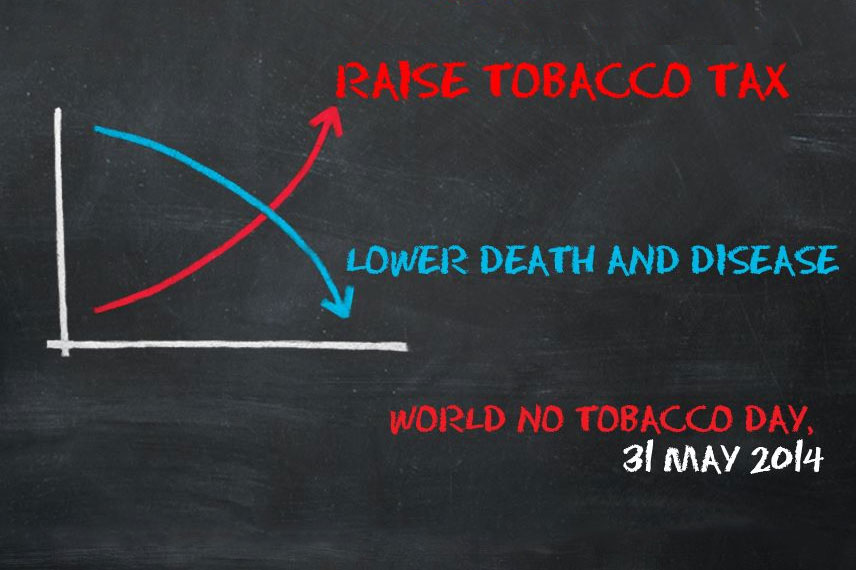December 26, 2025 10:14 am (IST)

UN advocates for higher tobacco taxes to save millions
New York, May 31 (IBNS): Ahead of World No Tobacco Day, the United Nations health agency is calling on countries to raise taxes on tobacco to encourage users to stop and prevent other people from becoming addicted to tobacco.
“Raising taxes on tobacco is the most effective way to reduce use and save lives,” says Margaret Chan, the Director-General of the World Health Organization (WHO). “Determined action on tobacco tax policy hits the industry where it hurts.”
Based on 2012 data, WHO estimates that by increasing tobacco taxes by 50 per cent, all countries would reduce the number of smokers by 49 million within the next 3 years and ultimately save 11 million lives.
On Friday, someone dies from tobacco use every six seconds, the agency noted in a news release issued ahead of the Day, observed on May 31. Tobacco kills up to half of its users. It also incurs considerable costs for families, businesses and governments.
“Treating tobacco-related diseases like cancer and heart disease is expensive. And as tobacco-related disease and death often strike people in the prime of their working lives, productivity and incomes fall,” WHO pointed out.
High prices are particularly effective in discouraging young people – who have more limited incomes than older adults – from taking up smoking. They also encourage existing young smokers to either reduce their use of tobacco or quit altogether.
“Price increases are 2 to 3 times more effective in reducing tobacco use among young people than among older adults,” said Douglas Bettcher, Director of the Department for Prevention of Noncommunicable Diseases at WHO.
“Tax policy can be divisive, but this is the tax rise everyone can support. As tobacco taxes go up, death and disease go down,” added Bettcher.
WHO calculates that if all countries increased tobacco taxes by 50 per cent per pack, Governments would earn an extra USD 101 billion in global revenue.
“These additional funds could – and should – be used to advance health and other social programmes,” Bettcher stated.
Countries such as France and the Philippines have already seen the benefits of imposing high taxes on tobacco. Between the early 1990s and 2005, France tripled its inflation-adjusted cigarette prices, and subsequently saw sales decrease by more than half.
A few years later the number of young men dying from lung cancer in France started to go down.
In the Philippines, one year after increasing taxes, the Government has collected more than the expected revenue and plans to spend 85 per cent of this on health services.
Tobacco use is the world’s leading preventable cause of death, killing nearly 6 million people each year, of which more than 600,000 are non-smokers dying from breathing second-hand smoke.
If no action is taken, tobacco will kill more than 8 million people every year by 2030, more than 80 per cent of them among people living in low- and middle-income countries.
(World No Tobacco Day 2014. Credit: WHO)
Support Our Journalism
We cannot do without you.. your contribution supports unbiased journalism
IBNS is not driven by any ism- not wokeism, not racism, not skewed secularism, not hyper right-wing or left liberal ideals, nor by any hardline religious beliefs or hyper nationalism. We want to serve you good old objective news, as they are. We do not judge or preach. We let people decide for themselves. We only try to present factual and well-sourced news.
Support objective journalism for a small contribution.
Latest Headlines
Zelensky’s Christmas message blends a call for peace in Ukraine with dark wish for Putin
Thu, Dec 25 2025
Telegram founder Pavel Durov — with 100 children already — offers to fund IVF for women using his sperm
Thu, Dec 25 2025
Zelenskyy’s demilitarised zone gambit: Ukraine’s 20-point peace plan puts Donbas, NATO-style guarantees at centre stage
Wed, Dec 24 2025
Conspiracy clouds Libyan army chief’s death: Plane crash in Turkey follows Asim Munir's meeting with rebel Khalifa Haftar
Wed, Dec 24 2025
Bamako under siege: Al-Qaida-linked JNIM pushes Mali—and West Africa—toward a security breaking point
Tue, Dec 23 2025
Who Is Lieutenant General Fanil Sarvarov? Senior Russian military officer killed in Moscow car bomb attack
Mon, Dec 22 2025
From Kabaddi to Courtroom: Three Indian-origin men sent to prison over violence during 2023 UK kabaddi event
Sun, Dec 21 2025
South Africa hit by second mass shooting this month; 10 dead
Sun, Dec 21 2025







